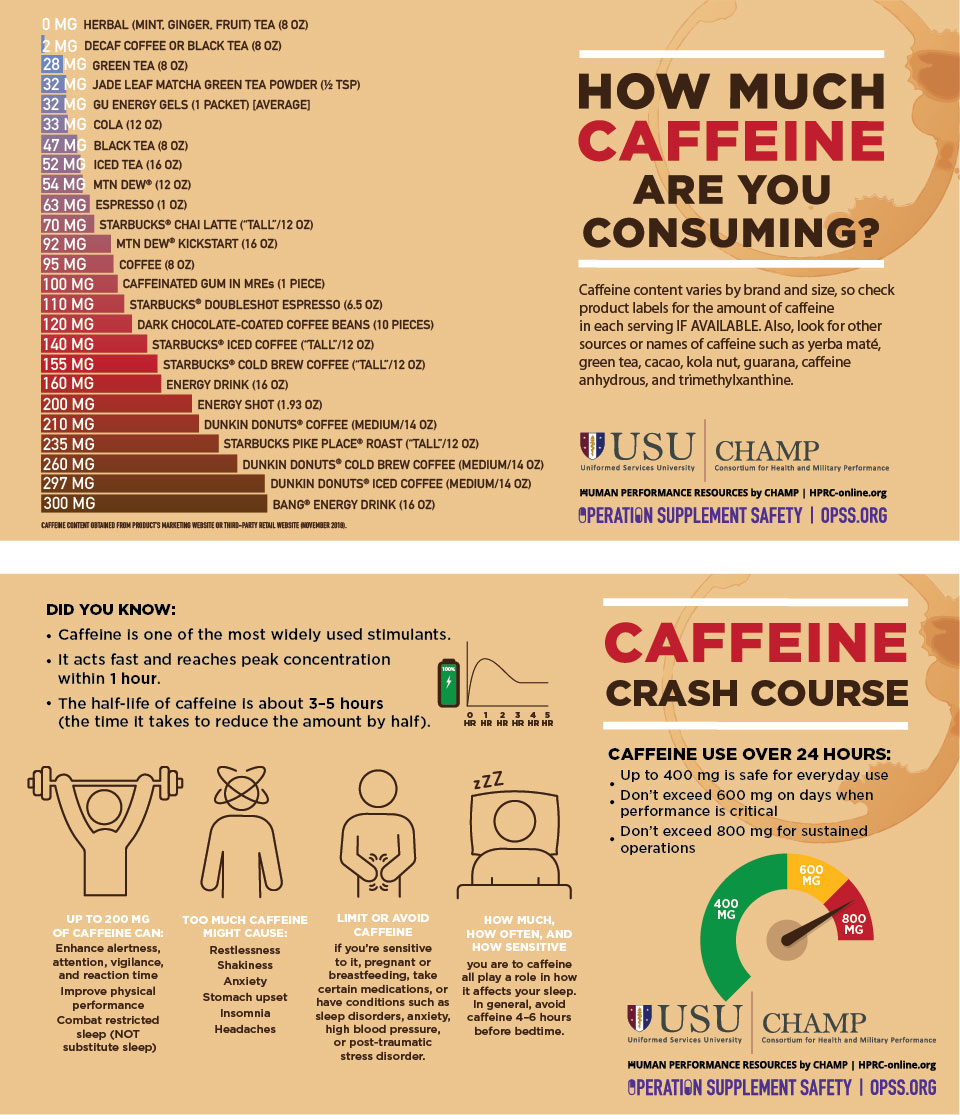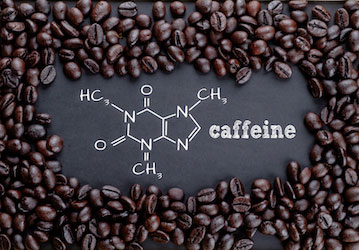Caffeine is one of the most widely consumed stimulants. The amount of caffeine in your daily coffee, tea, soda, or energy drink can vary greatly. Use the chart below to estimate how much caffeine you typically consume in a day.
You can use caffeine strategically to enhance your mental and athletic performance too. However, too much caffeine can cause negative side effects and put your health and performance at risk.
How much is too much caffeine? Scroll down and take our “crash course” for guidelines on caffeine use.

How much caffeine are you consuming?
8 ounces of herbal (mint, ginger, fruit) tea has 0 milligrams caffeine.
8 ounces of decaf coffee or black tea (8 oz) has 2 milligrams caffeine.
8 ounces of green tea has 28 milligrams caffeine.
A half teaspoon of Jade Leaf Matcha green tea powder has 32 milligrams caffeine.
1 packet of GU Energy Gels has 32 milligrams caffeine on average.
12 ounces of cola has 33 milligrams caffeine.
8 ounces of black tea has 47 milligrams caffeine.
16 ounces of iced tea has 52 milligrams caffeine.
12 ounces of Mountain Dew® has 54 milligrams caffeine.
1-ounce espresso has 63 milligrams caffeine.
A tall or 12-ounce Starbucks® Chai Latte has 70 milligrams caffeine.
16 ounces of Mountain Dew® Kickstart has 92 milligrams caffeine.
8 ounces of coffee has 95 milligrams caffeine.
1 piece of caffeinated gum has 100 milligrams caffeine.
A 6.5-ounce Starbucks® Doubleshot Espresso has 110 milligrams caffeine.
10 dark chocolate-coated coffee beans have 120 milligrams caffeine.
A tall or 12-ounce Starbucks® Iced Coffee has 140 milligrams caffeine.
A tall or 12-ounce Starbucks® Cold Brew coffee has 155 mg milligrams caffeine.
One 16-ounce energy drink has 160 milligrams caffeine.
A 1.93-ounce energy shot has 200 milligrams caffeine.
A medium or 14-ounce Dunkin Donuts® coffee has 210 milligrams caffeine.
A tall or 12-ounce Starbucks Pike Place® Roast has 235 milligrams caffeine.
A medium or 14-ounce Dunkin Donuts® Cold Brew coffee has 260 milligrams caffeine.
A medium or 14-ounce Dunkin Donuts® Iced Coffee has 297 milligrams caffeine.
A 16-ounce Bang® energy drink has 300 milligrams caffeine.
Caffeine content varies by brand and size, so check product labels for the amount of caffeine in each serving if available. Also, look for other sources or names of caffeine such as yerba maté, green tea, cacao, kola nut, guarana, caffeine anhydrous, and trimethylxanthine.
Caffeine Crash Course
Did you know caffeine is one of the most widely used stimulants? It acts fast and reaches peak concentration within 1 hour. The half-life of caffeine is about 3–5 hours (the time it takes to reduce the amount by half).
Up to 200 milligrams of caffeine can enhance alertness, attention, vigilance, and reaction time. It can improve physical performance too. It also can combat restricted sleep (NOT substitute sleep). Too much caffeine might cause restlessness, shakiness, anxiety, stomach upset, insomnia, and headaches. Limit or avoid caffeine if you’re sensitive to it, pregnant or breastfeeding, take certain medications, or have conditions such as sleep disorders, anxiety, high blood pressure, or post-traumatic stress disorder. How much, how often, and how sensitive you are to caffeine all play a role in how it affects your sleep. In general, avoid caffeine 4–6 hours before bedtime.
For caffeine use over 24 hours, up to 400 milligrams is safe for everyday use. Don’t exceed 600 mg on days when performance is critical. Don’t exceed 800 mg for sustained operations.
Published on: September 16, 2019
